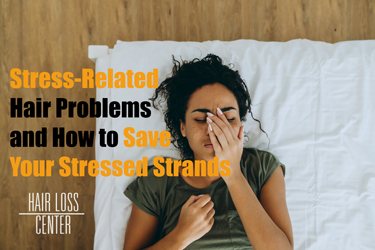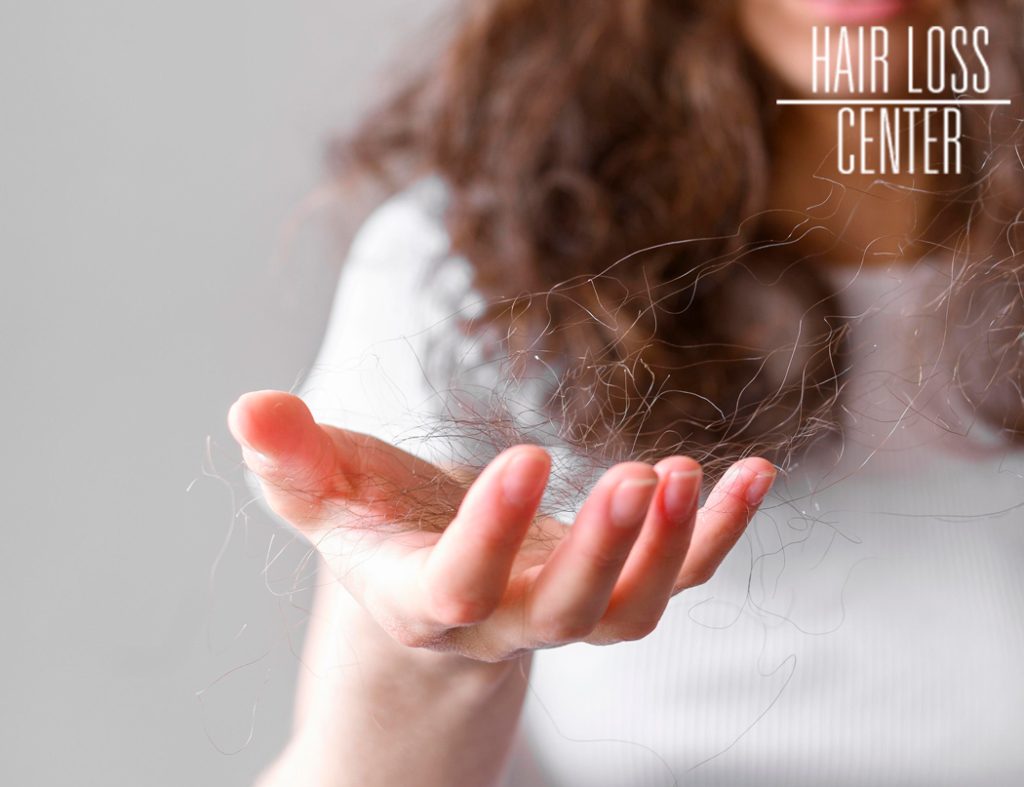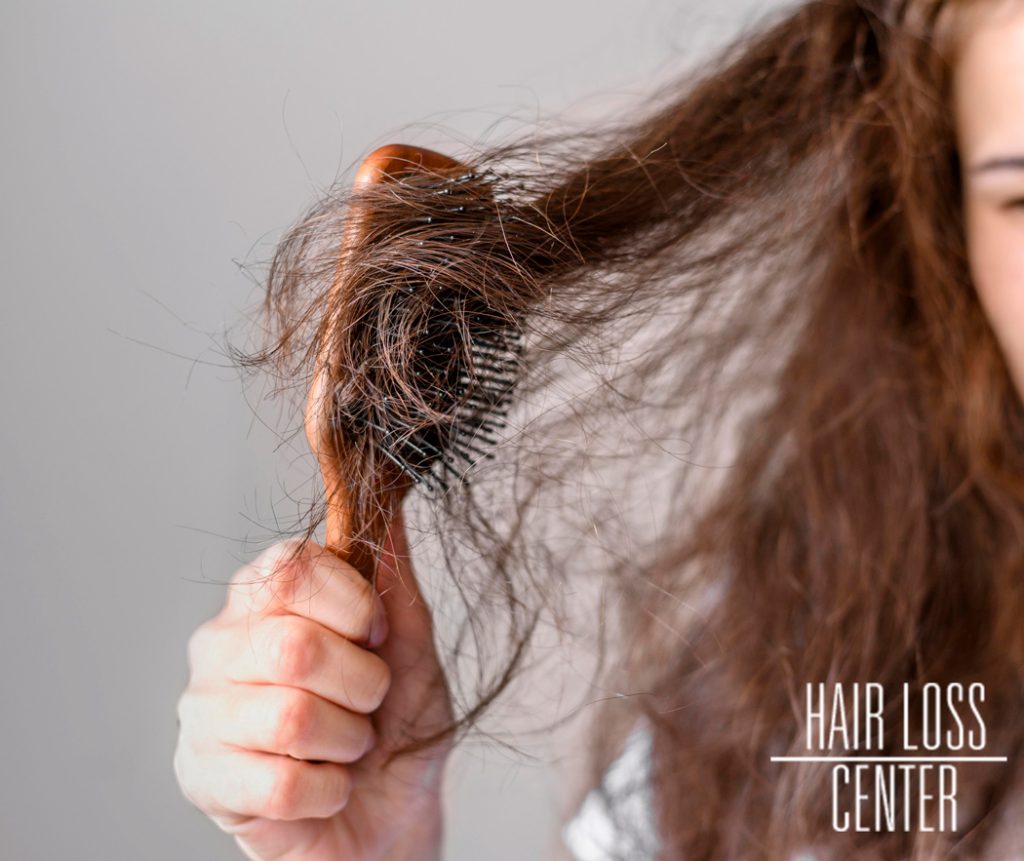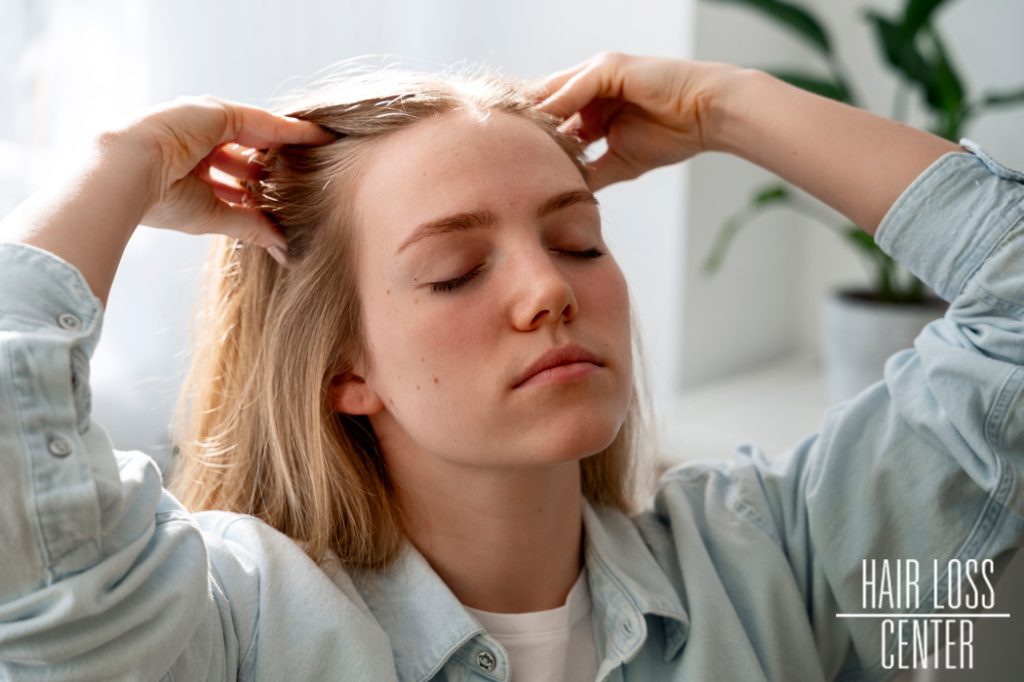

Stress-Related Hair Problems and How to Save Your Stressed Strands
In our demanding world nowadays, everyday stress can make us feel lousy but, unfortunately, that’s not all. It can affect our mental and physical well-being over time. And, one of the main side-effects is stress-related hair problems, such as hair loss, gray hair, dry hair, etc.
Let’s see how our locks are carrying the burden of our stressful lives and what we can do to promote healthy hair and cope with stress-induced hair loss and other related hair issues.
In this article, we’ll first go over the most common stress-related hair problems, then we’ll discuss the possible treatments. Plus, you’ll get some practical tips on managing stress and restoring your healthy hair.
No matter what’s causing your hair loss, Newport Hair Loss Centers in Southern California can provide consultation and the best custom human hair wigs.
Call now to schedule an appointment.
Stress and Hair Damage; The Most Common Stress-Related Hair Problems
Stress can impact our hair in different ways. It can be a change in its appearance or disruption in the hair growth cycle and, eventually, hair shedding. In any case, the struggle of our stressed-out locks is complicated and not at all superficial.
Numerous scientific studies have already proved the effects of stress on our hair conditions as well. So, it’s time to take it more seriously.
Here are 5 common stress-related hair problems you should be aware of.
1. Stress-Induced Hair Loss and the Effects of Stress on Hair Growth

Stress and hair thinning have long been associated. The reason is that research has shown that stress can trigger alopecia areata (See Psychological Stress-Induced Pathogenesis of Alopecia Areata), and more commonly, telogen effluvium (TE) (See Telogen Effluvium- a Review of the Science and Current Obstacles).
Prolonged stress or high levels of stress can cause many of our healthy hair follicles to enter the telogen phase too early. This is the resting phase of the follicles and the result will be slower hair growth, and excessive hair shedding after a few months. This condition is referred to as telogen effluvium.
However, the good news is that most of the time TE is temporary and when the underlying cause is controlled and resolved, we can see our hair regrowth. Of course, we should follow a healthy life and diet, and even use medication if needed, to enhance the regrowth.
Similarly, stress can trigger alopecia areata by disrupting our immune system. AA is an autoimmune hair condition that causes excessive hair loss, typically in the form of small round patches. This, too, can be temporary in many cases and needs proper treatment by dermatologists to promote hair regrowth.
Additionally, psychological stress and anxiety are known as the causes of trichotillomania (TTM), which is a psychological disorder in which the individual can’t stop pulling hair from their scalp or other parts of their body.
When you pull out the hair, you actually damage the follicle. That’s why trichotillomania results in hair loss which can even be permanent.
Overall, stress and hair shedding are related in different ways. So, if you’re experiencing a lot of stress, there’s a big risk of hair loss, one way or another.
2. Stress and Premature Graying of Hair
Although silver locks have been in style in the last couple of years, it doesn’t mean we want to push our natural hair to go gray prematurely.
According to the Natural Institutes of Health (NIH), prolonged stress can affect the stem cells that produce the hair pigment, leading to growing gray strands too early.
Watch this ITV report about the relationship between stress and premature graying of hair for more information.
3. Dry and Dull Hair; The Face of Stressed Strands

Examine some of your strands. Do you feel any difference in its texture? Or perhaps you think that you used to have shiny hair but now it appears dull and dry. Dehydrated hair and lack of enough sebum production can happen due to inadequate diet as well as stress.
So, your hair will get dry, fragile, and appear lifeless.
4. Stress Hormones Lead to Breakage and Brittle Hair
Stress hormones, including cortisol, make your body produce more androgen, which causes hair thinning (and even androgenetic alopecia in severe cases). Besides, cortisol may interfere with the protein structure of the strands and make them brittle.
Generally speaking, stress hormones are known to disrupt the normal functioning of follicles and affect the texture, structure, and growth of our hair (See Understanding Causes of Hair Loss in Women).
5. Stress and Scalp Health
Some scalp conditions, such as dandruff, seborrheic dermatitis (red and itchy patches on the scalp), and psoriasis (thick peeling patches on the scalp) are triggered and/or worsened by stress. All these conditions can cause irritation and lead to hair thinning.
Read our blog about Effective Scalp Care Habits to learn how your scalp health can affect your hair.
All in all, stress disrupts many processes in our body, such as hormonal balance and hair growth cycle, that impact our hair consequently. So, learning how to manage your stress and reduce it is the first step in coping with stress-related hair issues.
Coping with Stress-Related Hair Problems
Tips on Promoting Healthy Hair During Stressful Time
Based on our years of experience at our hair loss centers and the valuable feedback from our patients, we have figured out that preventing hair loss from stress, or other stress-related hair problems, isn’t possible unless you resolve the root cause of the stress. And, if you don’t know what’s causing this stress in your life, seek professional help, like counseling.
Here are some useful tips to maintain your healthy hair in stressful times and enhance hair regrowth.
Reduce Your Stress to Prevent Stress-Related Hair Problems
Everyone has their own way of coping with and managing the stress. Some may find traveling helpful, others may find it even more stressful. So, it’s important to get to know yourself better and find out what can really help you reduce your stress levels.
However, there are a few options that can be useful for everybody.
- Regular exercise and stretching: Any kind of sport and exercise, from walking to yoga and stand-up paddle boarding, aside from its health benefits (like regulating blood pressure, reducing the risk of cardiovascular diseases and other illnesses, etc.), is relaxing and makes you calm. Plus, if you just stretch for 5 to 10 minutes every day after you get up in the morning, you’ll feel more relaxed and healthier during the day.
- Meditation and Zen: Meditation and Zen are the best ways to become more mindful, relax, and focus. They also make you more open to accepting what’s happening in life.
- Spending more time with family and friends: Hanging out with people we love can always make us feel happier and loved. This also makes us relieve some stress and be more optimistic.
- Stay away from social media: Social media can be the cause of stress for many reasons. For example, cyberbullying, notifications, the pressure to answer messages, and losing track of time watching reel after reel can make you feel unsatisfied and anxious. So, by limiting our presence on social media, we’ll feel more content and relaxed.
- Listen to soothing music: Relaxing music is a great way to decompress.
Healthier Lifestyle, Healthier Hair
To have a healthier lifestyle, you should
- have a balanced diet: Make sure your body receives all the nutrients necessary for healthy hair and hair regrowth, such as B vitamins, protein, zinc, iron, copper, and other minerals. With the right food, you can even fight cancer.
- sleep well: Adults on average need 7 to 8 hours of sleep. But it’s not just about the quantity, quality of sleep is also important. If you think the quality of your sleep isn’t good enough, try meditation and exercising. They help you sleep better.
- avoid smoking and other drugs.
- have a good work-life balance and plan for your days, weeks, and months in advance to reduce work pressure and stress.
- not forget self-care activities, like allocating time to have fun and having hobbies.
Take Care of Your Scalp and Hair

- Follow a good hair care routine suitable for your type of hair.
- Prioritize your scalp and hair hygiene.
- Use standard products.
- Avoid using too much of styling products or heat styling tools.
- Seek professional help if you notice any sudden change in your scalp and hair.
- Stay hydrated.
- Avoid direct sunlight, especially during hot seasons. For example, cover your hair while tanning.
To sum up, exercising, meditating, having a balanced diet and a healthy lifestyle, and taking care of your scalp and hair the right way is necessary to prevent hair issues and boost its regrowth.
It’s good to remember that reducing stress levels, means reducing the risk of cancer and many other chronic diseases. So, don’t stress for your stress. Keep a positive attitude and just follow the stress reduction tips above.
Check out our special hair care products here.
FAQs about Stress-Related Hair Problems
Let’s answer some of your most common questions.
How Can I Know My Hair Loss Is Due to Stress?
Finding the cause of excessive hair shedding is not that simple. It usually involves examination and medical tests. However, some general signs can show you’re experiencing too much stress.
- Feeling exhausted all the time.
- Problems with sleeping.
- Having headaches, muscle tension, stomachaches, digestive issues, and higher pulse rate.
- Frequently catching colds and viruses.
- Lack of concentration, being irritable and experiencing mood swings.
- Sudden changes in eating patterns.
How Does Stress Change the Appearance of My Hair?
Aside from hair thinning, and even bald patches, stress makes hair strands lose their shine and vibrancy. They also get very fragile and can be easily broken. So, having dull, brittle, dry, and lifeless hair is one of the side effects of stress. Besides, chronic stress can lead to premature graying.
Will My Hair Look Good Again After Managing My Stress?
Yes. The quality of your hair will improve little by little after the stress levels are reduced. However, to help it improve faster, you should have a healthy diet and a good hair care routine.
Will My Hair Regrow After Stress Hair Loss?
In most cases, stress-induced hair loss is temporary and your hair will start to regrow when the cause of stress is addressed properly. Consult with your dermatologist for any medication and other treatments.
Newport Hair Loss Center Offers Special Hair Loss Products and Support
Many of us experience hair loss in a period of time in our lives. Regardless of the cause, it can be a distressing experience. That’s why, having a place to get emotional support as well as consultation can be a big help in dealing with hair loss.
Newport Hair Loss Center, with three branches in Orange 949-322-9555, Los Angeles 310-991-0087, and San Diego 949-640-4247, has been trying to make life a bit easier for cancer patients, alopecia patients, trichotillomania patients, and anyone else who is going through excessive hair shedding, by providing high-quality hair care products and medical human hair wigs.
Besides, you can count on our hair loss experts’ honest recommendations and advice during a free consultation session. Call for further information.
LA OFFICE
Beverly Hills
8383 Wilshire Blvd, First Floor
Los Angeles, CA 90211
ORANGE COUNTY OFFICE
NEWPORT BEACH
240 Newport Center Drive, Suite 111
Newport Beach, CA 92660
SAN DIEGO OFFICE
LA JOLLA
4660 La Jolla Village Dr. Suite100
San Diego, CA 92122
NEWPORT HAIR LOSS CENTER
Newport Hair Loss Center gives hair loss sufferers a way to restore their appearance and boost their confidence, whether they are suffering from trichotillomania, alopecia, or are currently going through chemotherapy.
Site Map

